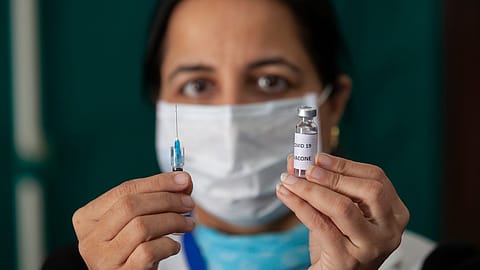Russia to mass-produce Covid-19 vaccine in India
RDIF has tied up with nearly a dozen contract manufacturers with idle capacity to produce some 1.5 billion doses of Sputnik V annually, more than what Serum and Bharat Biotech will jointly produce.

The Russian technical team’s visit to India in November 2020 was partly shrouded in secrecy. The team, comprising members from Russian Direct Investment Fund (RDIF), a sovereign wealth fund which funded the development of a Covid-19 vaccine, Sputnik V, was scouting for idle vaccine manufacturing capacities in the country. It went on a whirlwind tour of at least half a dozen manufacturing facilities spread across India, starting from Hyderabad.
A few weeks before the visit, Vinod Paul, a NITI Aayog member, revealed in one of the weekly briefings held by the health ministry that the government of Russia had reached out to them and sought help to consider manufacturing of Sputnik V through a network of Indian companies. In January, when Fortune India reached out to Hyderabad-based Virchow Biotech, one of the contract manufacturers of Sputnik V, Dr Hemanth Nandigala, managing director, refused to talk about the deal, citing a non-disclosure agreement. Though Virchow had signed an agreement in January, a confidential disclosure agreement (CDA) apparently stopped him from going public with the information.
Last week, Virchow became the fourth Indian manufacturer to join the bandwagon and said it would produce up to 200 million doses of Sputnik V annually. Before Virchow, Hetero Biopharma (100 million doses), Gland Pharma (252 million doses), and Stelis Biopharma (200 million doses) had signed similar agreements with RDIF. The ramp up in volume is still going on. The Russians have either signed or are in advanced stages of tying up with several other manufacturers having unused capacity with a technology transfer/licence agreement.
Industry officials said companies such as Panacea Biotec, Shilpa Medicare, and Natco Pharma are among the leading companies on board (or soon to be) with RDIF. Biocon, which is trying its hand at an indigenous vaccine, is also in discussions with the Russians, according to the officials. Rumours are also afloat that Serum Institute of India (SII), the world’s largest vaccine manufacturer by volume, which is already mass-producing Covishield, the AstraZeneca-Oxford vaccine, may also join hands with the Russians.
The combined volume of Sputnik V manufacturing in India will easily surpass the annual capacities utilised for production of the two other vaccines—Covishield and the indigenously-developed Covaxin. “The Russians have gone ahead and picked up every vaccine manufacturing capacity that is lying idle. They have targeted more than 1.5 billion doses from India,” said the head of a company that has already signed an agreement with RDIF.
On the face of it, it looks an astute business move by the Russians. “It takes an effort to get on board with so many contract-manufacturing companies, without making any noise. The fact is that not many knew in India that the country had such a huge reservoir of idle biological manufacturing capacity. I expect more companies to come on board to mass-produce Sputnik V,” said the executive quoted above.
While the Russians are getting most of their vaccine manufacturing done in India, SII and Bharat Biotech International Ltd (BBIL), the two big players in the Indian vaccine market, are seeking government aid for expanding their annual capacities for Covid-19 vaccines. The two companies have invested heavily to ramp up their capacities in Hyderabad, Pune, and Bengaluru and have a combined annual capacity of around 1.3 billion doses for the Covid-19 vaccines.
Recommended Stories
SII is in the process of more than doubling its production capacity in Pune at breakneck speed. It will scale up its annual capacity (for all vaccines, combined) to 2.4 billion doses with a second facility going on stream by 2021-end, from 1.5 billion doses available now. The company, which predicts a further spike in demand, is now looking to enhance capacity further with a third facility. At present, more than half of its available capacity is utilised for producing Covishield while the remaining is dedicated to the manufacture of several other vaccines, running into two dozen of them. An SII spokesperson said the company is currently producing 2.4 million doses a day.
BBIL is also on a capacity expansion spree. The annual capacity for Covaxin is expected to reach 700 million doses by June-July, up from 200 million now. Three more BSL-3 (Biosafety level 3) facilities are being readied -- one each at Hyderabad’s Genome Valley, Bengaluru and Ankleshwar (in Gujarat).
“It is unfortunate that we allowed a Russian company to sweep the entire unutilised capacities for their production when the government could have been put it to India’s advantage, especially in the times of Covid-19 diplomacy,” said an industry official.
Dr Reddy’s Laboratories (DRL), which is conducting clinical trials for Sputnik V in India, recently said that it expects to get approval in the next few weeks. DRL had applied for restricted emergency use authorisation for Sputnik V in February. According to the agreement with RDIF, DRL will market the vaccine in India. It said it hoped to supply to both the government and the private market.
(INR CR)
DRL said the human adenoviral vector (flu virus)-based vaccine candidate has demonstrated an efficacy rate of 91.6% in the interim analysis of its phase 3 clinical trials, which included the data of 19,866 volunteers in Russia, who received both first and second doses of the vaccine. Sputnik V maintained an efficacy rate at 91.8% even among the group of 2,144 volunteers who are over 60 years old, claimed DRL.
Meanwhile, the expert panel advising the Indian drugs regulator has reportedly asked DRL to come back with more data on safety and immunogenicity from its phase 2 and phase 3 studies on the vaccine.
“Everyone is keenly awaiting regulatory approval to ramp up commercial production,” the official said.